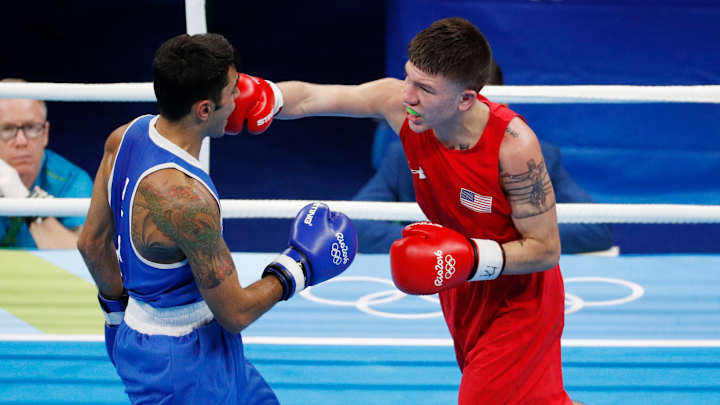4 years after Olympic KO, US boxers make strong start in Rio

RIO DE JANEIRO (AP) Coaches Billy Walsh and Kay Koroma realize the daunting nature of the task they face at USA Boxing. Once the gold standard of the Olympic sport, the American men fell to the nadir of a medal-free trip to London four years ago.
It got so bad at the last two Olympics that when American fighters faced trouble, they would often look to the stands - where their fathers or home coaches were screaming to them - instead of listening to the U.S. coach in their corner.
Walsh and Koroma have the attention of the American team this time around, and the results are already quite encouraging.
Lightweight Carlos Balderas' unanimous decision over Japan's Daisuke Narimatsu on Tuesday pushed the U.S. team to a surprising 4-0 at the Olympics. Light flyweight Nico Hernandez also won his first two fights, but middleweight Charles Conwell took the Americans' first loss Tuesday night, losing to India's Vikas Krishan.
''There's no prizes been given out yet, but we're very happy,'' Walsh said. ''This team is on a roll, and there's good momentum. These two guys are in a position where they're one shot away from a medal, which is a fantastic achievement.''
Four years after a nine-man American team won only five fights in London and failed to bring home any medals for the first time ever, the current six-man U.S. team has already won four times before four of its fighters even step in the ring.
In 2012, Errol Spence was the only American man even to reach the Olympic quarterfinals by winning two bouts. Hernandez and Balderas have already done it in the first four days, returning a bit of respect to the nation that still has the most total boxing medals in Olympic history.
''I think we probably shut up a couple of people,'' said Koroma, a Virginia-based amateur coaching veteran. ''These kids are more mature than the elite athletes we've had representing the USA before. They want this more. They're more hungry. They study this. It's their moment, and they're going to run with it.''
Walsh's job title designates him as the women's head coach because that's how USA Boxing procured the funds to hire the longtime head of the Irish national team, but he coaches all eight American boxers in Rio. Koroma is USA Boxing's associate coach and a key mentor to the men, but he is also the personal coach of top bantamweight Shakur Stevenson, the Americans' top medal hope heading into the games.
''As long as you trust one coach, we can all come together as one,'' Koroma said. ''If one coach says something, the other coaches go along with it and we run with it. Billy might have a game plan and I might have a game plan. Billy might start his game plan off, and I might throw something in. I've known all the kids since they were like 8 years old, so having that relationship, they know I have their best interests at heart.''
That trust is a major factor in any boxing coach's success, and Americans were shockingly uninterested in their national team coaches' advice at previous Olympics. They turned to the stands for advice when things got tough in London and Beijing.
Walsh, whose Irish team won an impressive four medals in London, is trying to counter that instinct by building trust with the fighters' home camps. Most American boxers' personal coaches - who are usually their relatives - visited Colorado Springs while the U.S. team prepared for Rio.
''They come to the camp and they see the type of things I'm teaching them,'' Walsh said. ''I tell them, `I feel this is how we can get better. I want you to go back to your gym and practice this.' I show them the type of stuff that we do, and when they've seen their performances, they know it works. I think they'll buy into it for these first few months, anyway.''
Earlier this summer, Walsh staged a multi-nation training camp in Colorado Springs, bringing in fighters from Azerbaijan, France and elsewhere. It's a common practice for top teams in Europe and elsewhere, but rare for Americans.
''We were sparring every day with different styles, and that's what got us here,'' Balderas said.
Hernandez and Balderas both made key strategic adjustments during their bouts at the U.S. coaches' advice - something that seems simple, yet hardly ever happened at the previous two Olympics.
